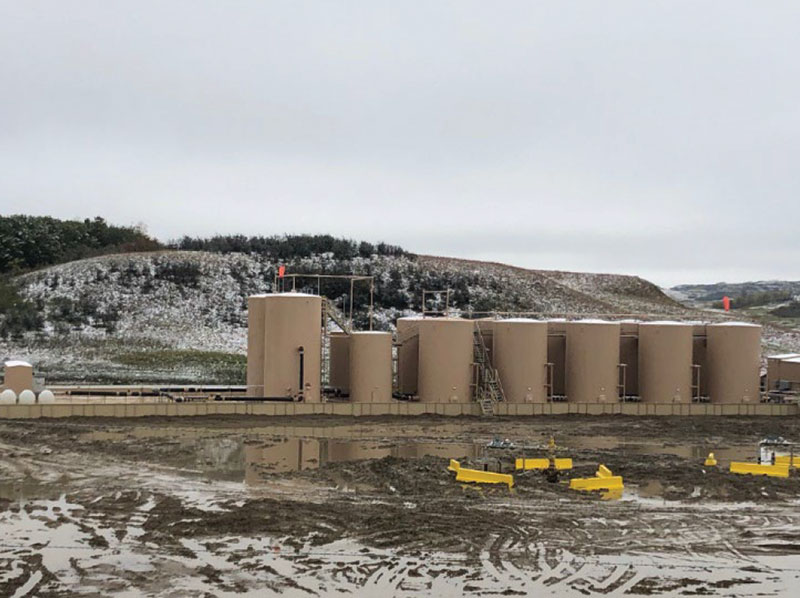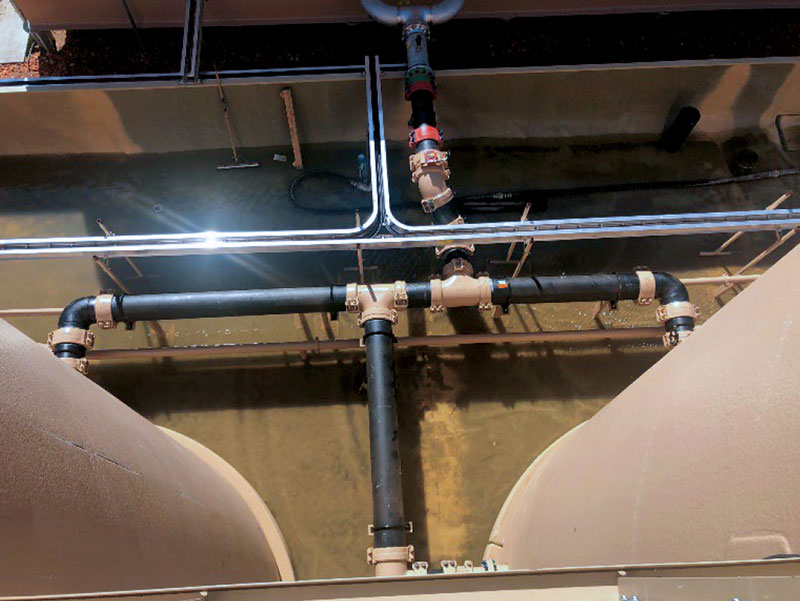April 2022, Vol. 249, No. 4
Features
Salt Water Disposal Facility Takes PPI Honor for Piping Systems Division
Special to P&GJ
To process the extremely hot and corrosive saltwater from oil and gas drilling operations, the Gondor Saltwater Disposal (SWD) facility, in McKenzie County, North Dakota, used a network of high-density polyethylene (HDPE) pipe that required almost 700 couplings even though the system had fewer than 1,800 feet of pipe.
In May 2021, the application and complexity of the piping system was named Project of the Year by the Energy Piping System Division of the Plastics Pipe Institute, Inc. (PPI). The association’s annual awards program recognizes projects and members for exceptional contributions to the industry.
Submissions in the association's divisions are reviewed, evaluated and voted upon by the PPI members. PPI is the major North American trade association representing the plastic pipe industry.
Permitted to accept up to 50,000 bpd of produced water, the Crestwood Midstream Partners LP (Houston, TX) facility has two wells, two separators, two oil storage tanks, and 10 produced water storage tanks across nearly three acres in western North Dakota.
The project, which was constructed using both onsite installation and in-shop fabrication, consisted of nearly a third-of-a-mile of 2- to 12-inch diameter, DR 9 HDPE pipe and hundreds of Victaulic Style 905 Installation-Ready and Victaulic Style 907 Transition Couplings. Water temperature is typically 120o F.
The facility processes the liquid and separates the oil and water. The water then can be injected back into the ground, and the oil sold to the market.
“This is one of the most intensive valve and fitting installations that we have ever seen,” stated David M. Fink, president of PPI upon presenting the award to the coupling manufacturer, Victaulic, a PPI member company. “Plus, all the pipe was installed above ground in vertical and overhead runs in just three days. The nature of the Gondor facility and the success of the Victaulic couplings in this highly specialized pipe system combined to make this the Project of the Year.”
Crestwood chose to use HDPE pipe due to its cost certainty, constructability, and system longevity. As the team began planning for construction, Crestwood’s producing partners continued to forecast an increase in produced saltwater volume, making it imperative for them to identify an efficient option to keep the project under budget and manage the tight construction timeline demands. Assembling the system took three days.
“HDPE was the best choice from a cost, constructability and longevity perspective,” said Mark Donnelly, a senior project manager at Crestwood. “Gondor is compatible with HDPE because of the way our system is laid out. There is a continuous inlet flow through the pipes that helps keep them warm, so even when we get those really cold North Dakota days, the cold won’t settle into the pipes.”
Victaulic assisted with the design and fabrication of the Gondor project, cutting weeks off of the original construction estimate. The HDPE couplings installed with minimal effort, and onsite assembly required only simple hand tools, without the risk of weather delays.
The use of Victaulic couplings eliminated challenging fitting-to-fitting connections, and vertical and overhead installation was quickly and easily accomplished. Victaulic mechanical joining solutions also enabled simple field corrections of alignment errors, mitigating onsite delays and schedule interruptions.
According to the company, using prefabricated parts is up to four times more productive than field fabrication, with twice as much work can be completed per man-hour. On the Gondor project, the combination of prefabricated HDPE pipe and onsite fit-ups using Victaulic HDPE couplings required virtually no rework in the field.
“The efficiencies realized through the use of HDPE, both in the field and in the fabrication shop, enabled owners to achieve multiple wins,” said Randy Knapp, engineering director of the Energy Piping Systems Division of PPI. “This included uncovering opportunities for cost savings and risk reduction, while improving construction quality plus delivering on time and within budget.”
He added that the saltwater is a waste product that is produced and separated from oil during the production process.
In North Dakota, a little more than one barrel of saltwater is produced for every one barrel of oil. Generally, this saltwater is too salty to be recycled so it must be injected underground well below the underground sources of groundwater.
The Plastics Pipe Institute, Inc. (PPI) is the major North American trade association representing the plastic pipe industry and is dedicated to promoting plastic as the materials of choice for pipe and conduit applications.







Comments